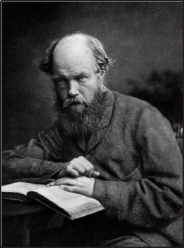- TAIT
- UNITED KINGDOM (see also List of Individuals)\
 28.4.1831 Dalkeith/UK - 4.7.1901 Edinburgh/UK\Peter Guthrie Tait was educated in mathematics and natural philosophy at the Edinburgh and Cambridge Universities. From 1852 to 1856 he worked with a colleague on the book Dynamics of particles, in which Newton's proper position in dynamics was re-established. In 1854 Tait moved to Belfast as a professor of mathematics at Queen's College and made a lasting friendship with James Thomson (1822-1892). In 1860 Tait was elected professor of natural philosophy at Edinburgh University, because his proclivity lay towards physics rather than pure mathematics. In the same year, he was elected Fellow of the Royal Society of Edinburgh. During the 1860's Tait translated important papers on the vortex theory including those of Hermann von Helmholtz (1821-1894). He also came into contact with William Thomson, the later Lord Kelvin (1824-1907) with whom he published as T&T the Natural Philosophy in 1867. This book appreciates the concept of energy conservation, which was just then obtaining recognition among physicists, and T&T demonstrated that energy was a fundamental physical entity and that its conservation was a predominant and all-controlling property. This treatise took a rank with Newton's Principia, Laplace's Mécanique célèste or Clerk Maxwell's Electricity and magnetism.\Tait contributed articles to the Encyclopædia Britannica, notably "Mechanics" and "Dynamics". In 1881 he dealt with the pressure effect on the readings of thermometers used in deep-sea soundings, and on the compressibility of water. In the 1880s, Tait - an ardent votary of golf - studied the flight of a golf ball, which he saw was not that of a smooth heavy sphere through a resisting medium. After endless experiments, he discovered the principle of the "underspin", which gave a new development to the art of the game. Tait's alertness of the mind and versatile interests led to the careful and abstract inquiry in every possible direction, often apparently playful. Tait's eminence was widely recognized. Although he was never a Fellow of the Royal Society, he received a Royal Medal from the society in 1886.\Anonymous (1912). Tait, Peter Guthrie. Dictionary of National Biography Supplement 1: 471-474. Smith, Elder&Co: London.Knott, C.G. (1911). Life and scientific work of Peter G. Tait. University Press: Cambridge. PLord Kelvin (1901). Professor Tait. Proc. Royal Society of Edinburgh 23: 498-504.Tait, P.G. (1890). Note on ripples in a viscous liquid. Proc. Royal Society Edinburgh 17: 110- 115.Tait, P.G. (1900). Scientific papers. University Press: Cambridge.
28.4.1831 Dalkeith/UK - 4.7.1901 Edinburgh/UK\Peter Guthrie Tait was educated in mathematics and natural philosophy at the Edinburgh and Cambridge Universities. From 1852 to 1856 he worked with a colleague on the book Dynamics of particles, in which Newton's proper position in dynamics was re-established. In 1854 Tait moved to Belfast as a professor of mathematics at Queen's College and made a lasting friendship with James Thomson (1822-1892). In 1860 Tait was elected professor of natural philosophy at Edinburgh University, because his proclivity lay towards physics rather than pure mathematics. In the same year, he was elected Fellow of the Royal Society of Edinburgh. During the 1860's Tait translated important papers on the vortex theory including those of Hermann von Helmholtz (1821-1894). He also came into contact with William Thomson, the later Lord Kelvin (1824-1907) with whom he published as T&T the Natural Philosophy in 1867. This book appreciates the concept of energy conservation, which was just then obtaining recognition among physicists, and T&T demonstrated that energy was a fundamental physical entity and that its conservation was a predominant and all-controlling property. This treatise took a rank with Newton's Principia, Laplace's Mécanique célèste or Clerk Maxwell's Electricity and magnetism.\Tait contributed articles to the Encyclopædia Britannica, notably "Mechanics" and "Dynamics". In 1881 he dealt with the pressure effect on the readings of thermometers used in deep-sea soundings, and on the compressibility of water. In the 1880s, Tait - an ardent votary of golf - studied the flight of a golf ball, which he saw was not that of a smooth heavy sphere through a resisting medium. After endless experiments, he discovered the principle of the "underspin", which gave a new development to the art of the game. Tait's alertness of the mind and versatile interests led to the careful and abstract inquiry in every possible direction, often apparently playful. Tait's eminence was widely recognized. Although he was never a Fellow of the Royal Society, he received a Royal Medal from the society in 1886.\Anonymous (1912). Tait, Peter Guthrie. Dictionary of National Biography Supplement 1: 471-474. Smith, Elder&Co: London.Knott, C.G. (1911). Life and scientific work of Peter G. Tait. University Press: Cambridge. PLord Kelvin (1901). Professor Tait. Proc. Royal Society of Edinburgh 23: 498-504.Tait, P.G. (1890). Note on ripples in a viscous liquid. Proc. Royal Society Edinburgh 17: 110- 115.Tait, P.G. (1900). Scientific papers. University Press: Cambridge.
Hydraulicians in Europe 1800-2000 . 2013.
